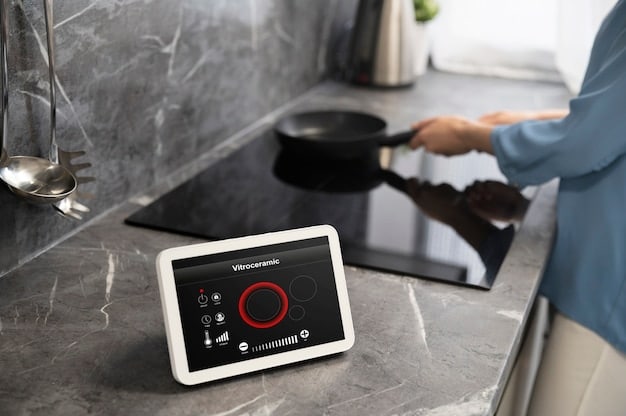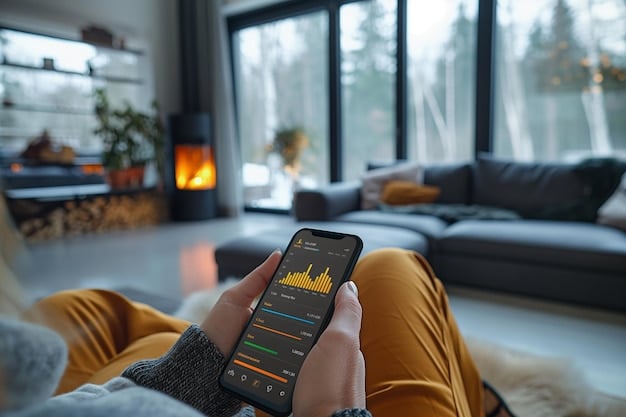AI-Powered Smart Homes: Comfort, Security & Energy Efficiency for US Homeowners

AI-powered smart homes offer US homeowners enhanced comfort, security, and energy efficiency through intelligent automation, data-driven insights, and seamless integration of various home systems.
Imagine a home that anticipates your needs, optimizes energy consumption, and keeps you safe – all powered by artificial intelligence. AI-powered smart homes: enhancing comfort, security, and energy efficiency for US homeowners are rapidly transforming the way we live.
Understanding AI’s Role in the Modern Smart Home
Artificial intelligence is no longer a futuristic concept; it’s a present-day reality that’s revolutionizing our homes. AI-powered smart homes: enhancing comfort, security, and energy efficiency for US homeowners are experiencing a surge in popularity as homeowners seek to optimize their living spaces.
AI algorithms analyze data from various smart devices, learning user preferences and adapting to routines. This allows for personalized experiences like automated lighting, temperature adjustments, and proactive security measures, resulting in a more comfortable, efficient, and secure home environment.
Personalized Comfort and Convenience
AI algorithms analyze data from smart thermostats, learning your preferred temperature settings at different times of the day. This allows the system to automatically adjust the temperature based on your habits and external weather conditions.
Smart lighting systems with AI can learn your preferred lighting levels for different activities, such as reading, watching TV, or cooking. The system can then automatically adjust the brightness and color temperature to create the perfect ambiance for any occasion.
- Automated adjustments based on personal preferences
- Voice-controlled commands for ease of use
- Smart scheduling to optimize comfort levels

The integration of AI into smart home technology unlocks unprecedented possibilities for personalized comfort and convenience, adapting to our ever-changing lifestyles and preferences.
Enhancing Home Security with AI
Home security is a major concern for many US homeowners. Luckily, AI is providing enhanced security options. AI-powered smart homes: enhancing comfort, security, and energy efficiency for US homeowners now come equipped with intelligent surveillance systems.
AI-powered security systems can differentiate between normal activity and potential threats, reducing false alarms and improving response times. These systems can also integrate with local law enforcement for faster dispatch in case of emergencies, providing homeowners with peace of mind knowing their homes are protected.
Intelligent Surveillance Systems
AI-powered security cameras can analyze video footage in real-time, identifying suspicious activity such as a person loitering near your property or a package being stolen from your doorstep. The system can then send you an alert on your smartphone, allowing you to take appropriate action.
AI-powered door locks can use facial recognition or fingerprint scanning to grant access to authorized individuals, eliminating the need for keys. These locks can also be remotely controlled from your smartphone, allowing you to grant access to guests or service providers even when you are not home.
- Real-time threat detection and alerts
- Remote access and control of security systems
- Integration with local law enforcement for faster response times
AI plays a crucial role in providing proactive security measures, safeguarding homes from potential threats, and increasing overall peace of mind.
Optimizing Energy Efficiency with AI
Energy efficiency is a key factor for US homeowners looking to save money and reduce their carbon footprint. AI-powered smart homes: enhancing comfort, security, and energy efficiency for US homeowners are equipped to optimize energy consumption.
By learning your energy usage patterns and identifying areas where energy is being wasted, AI can make intelligent adjustments to your heating, cooling, and lighting systems, helping you save money on your utility bills. AI also facilitates smart load balancing, shifting energy consumption to off-peak hours to reduce strain on the grid and lower costs.
Smart Energy Management Systems
AI-powered smart thermostats can learn your daily routines and adjust the temperature accordingly, ensuring that you are only heating or cooling your home when you need to. The system can also take into account external factors such as weather conditions to optimize energy consumption.
Smart lighting systems with AI can automatically dim or turn off lights in unoccupied rooms, reducing energy waste. These systems can also be programmed to adjust the brightness based on the amount of natural light available, further reducing energy consumption.

- Automated adjustments based on energy usage patterns
- Smart scheduling and load balancing capabilities
- Integration with renewable energy sources for optimized efficiency
Smart energy management systems not only reduce energy consumption but also contribute to a more sustainable lifestyle.
The Growing Market for AI-Powered Smart Homes
The market for AI-powered smart homes is experiencing significant growth in the US, driven by increasing consumer awareness, technological advancements, and a desire for greater convenience and efficiency. AI-powered smart homes: enhancing comfort, security, and energy efficiency for US homeowners are rapidly adapting to meet the demands of modern lifestyles.
As the technology matures and becomes more affordable, AI-powered smart home solutions are becoming accessible to a wider range of homeowners, creating new opportunities for manufacturers, service providers, and technology integrators.
Adoption Trends and Demographics
Early adopters of AI-powered smart home technology tended to be tech-savvy millennials and affluent homeowners. Now, market research indicates that interest is widening to include older generations and families looking for enhanced security and energy savings.
The increasing availability of affordable smart devices and user-friendly interfaces is driving wider adoption, making it easier for homeowners of all ages and technical abilities to integrate AI into their homes.
The smart home market is becoming increasingly competitive, with major tech companies like Amazon, Google, and Apple vying for market share alongside established home automation providers. This competition is spurring innovation and driving down prices.
The growing interest in AI-powered smart homes underscores the increasing value people place on connected living and the potential of technology to improve daily life.
Challenges and Considerations
While the benefits of AI-powered smart homes are undeniable, several challenges and considerations must be addressed to ensure responsible and ethical implementation. AI-powered smart homes: enhancing comfort, security, and energy efficiency for US homeowners can raise privacy concerns.
Addressing data privacy concerns, ensuring cybersecurity, and improving interoperability are crucial for realizing the full potential of AI-powered smart homes while maintaining user trust and security.
Data Privacy and Security Risks
Smart home devices collect vast amounts of data about our daily routines, habits, and preferences. This data can be vulnerable to hacking and misuse, raising concerns about privacy and security.
It’s essential to choose smart home devices from reputable manufacturers that prioritize data security and offer robust privacy controls. Homeowners should also take steps to secure their home networks and use strong passwords to protect their devices.
- Addressing data privacy concerns is paramount
- Ensure robust cybersecurity measures
- Balancing convenience with security
Data privacy and security are paramount to ensure that the benefits of technology do not come at the expense of security.
Future Trends in AI-Powered Smart Homes
The future of AI-powered smart homes is brimming with possibilities, as advancements in AI, IoT, and connectivity technologies pave the way for even more intelligent, personalized, and seamless experiences. AI-powered smart homes: enhancing comfort, security, and energy efficiency for US homeowners will continue to evolve.
Anticipate voice-first interfaces, proactive automation, and advanced integration with other smart systems and services, further enhancing the comfort, security, and sustainability of our homes.
Voice-First Interfaces and Natural Language Processing
Voice assistants like Amazon Alexa and Google Assistant are already a central part of many smart homes, allowing users to control devices, access information, and automate tasks with voice commands. Future advancements.
Improvements in natural language processing will make voice interactions more natural and intuitive, allowing users to communicate with their smart homes in a conversational manner. Also, with gesture recognition technology you can control devices with simple hand gestures.
The future of AI-powered smart homes lies in seamlessly integrating technology into our daily lives, enhancing comfort, security, and convenience while respecting privacy and security.
| Key Feature | Brief Description |
|---|---|
| 💡 Energy Savings | AI optimizes energy use, cutting costs. |
| 🔒 Enhanced Security | AI provides smart surveillance and alerts. |
| 🛋️ Comfort | AI learns and adjusts to your preferences. |
| 🤖 Automation | Tasks are automated, simplifying daily routines. |
FAQ
▼
AI learns your energy habits and adjusts thermostat and lighting, reducing waste. It optimizes schedules based on weather and occupancy, leading to significant savings on utility bills.
▼
AI powers smart surveillance, detecting unusual activity and sending alerts. It enhances door locks with facial recognition and integrates with law enforcement for quicker responses to emergencies.
▼
Modern AI smart home devices are designed for user-friendliness with intuitive interfaces. Many offer plug-and-play setup. Voice assistants like Alexa and Google Assistant simplify control.
▼
Smart homes collect data about your routines and preferences, raising concerns about hacking and misuse. Choose devices from manufacturers prioritizing data security and protecting your sensitive data.
▼
AI will lead to more personalized and proactive smart homes. Voice interfaces and automation will be improved, making homes safer, comfortable, and more sustainable. It will transform lives.
Conclusion
AI-powered smart homes are transforming the US residential landscape, offering innovative solutions for comfort, security, and energy efficiency. As technology advances, AI will become integral to creating more responsive living spaces.





